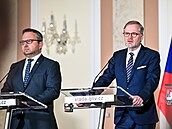Czech financier and real estate magnate Radovan Vítek will take over the Kč 400 million loan Raiffeissenbank granted to lottery company Sazka, only for Kč 300 million, a reliable source told Czech Position.
Raiffeissenbank has neither confirmed nor denied the transaction. “As a matter of principle I don’t comment on our bank’s deals,” Lubor Žalman, chief executive of the Czech branch of Raiffeissenbank, told Czech Position.
Radovan Vítek did not immediately respond to enquiries.
Speculation that Raiffeissenbank intended to withdraw from the pool of Sazka’s creditors had been circulating for some time. In October reports emerged that Sazka’s other creditors, Česká spořitelna, Komerční banka and Fortis, would take over Raiffeissenbank’s share of the receivables.
Rumors that Raiffeissenbank would withdraw from the pool of Sazka creditors had been circulating for some time.
Sazka, which under the law has to pay a portion of its profits to national sport federations, incurred its large debts when financing the construction of Sazka Arena (now O2 Arena), a multipurpose stadium in Prague 9–Libeň. The stadium opened in April 2004 to host the Hockey World Championships. Construction costs were estimated at Kč 8 billion.
In an April, 2009 interview with the daily Hospodářské noviny, Sazka Chief Executive Aleš Hušák said that although the stadium had become profitable, it would not generate enough to pay off the debt.
“The arena is able to pay for its own upkeep, nondeductible expenses and minor developments. … But in no way is this enough for it to be able to pay the money used for its construction,” Hušák told the daily.















